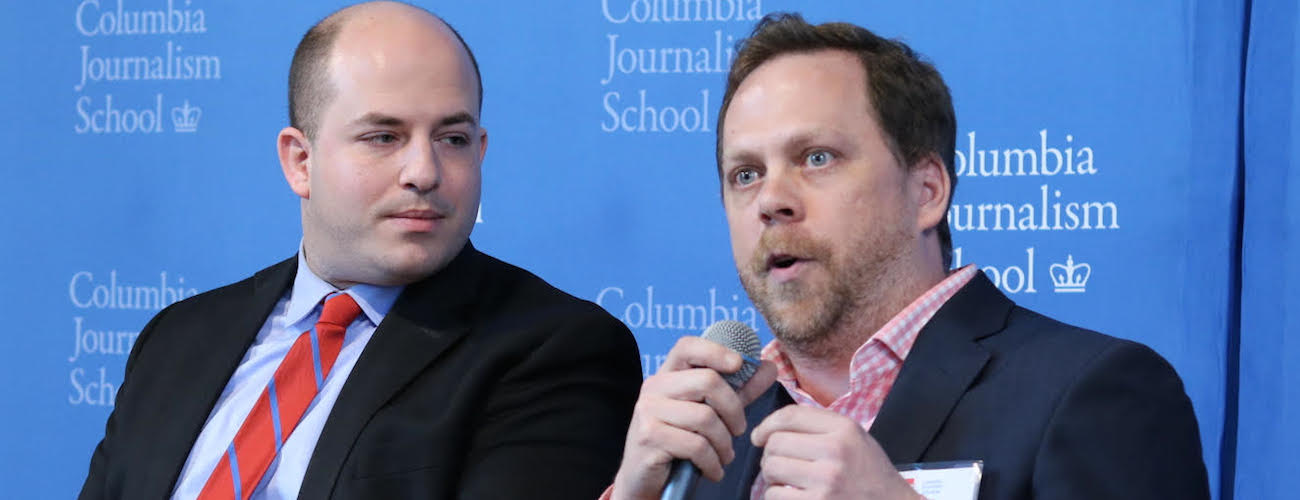Sign up for The Media Today, CJR’s daily newsletter.
A Breitbart News editor called the publication he recently joined “the most innovative and exciting source of journalism in America” on Friday, calling out mainstream media bias and inaccuracy while accepting no similar responsibility for the misleading and at times incendiary work for which his organization is criticized.
“The real threat to public confidence in the media is all these demonstrably false stories that our colleagues have produced,” Breitbart economics editor John Carney told a packed audience at Columbia Journalism School. “I don’t think you’re reading a lot of false news in Breitbart.”
The comments, made as Breitbart’s lead story was an aggregation of a right-wing radio host lambasting former President Barack Obama for allegedly undermining the Trump administration, came at a panel discussion co-hosted by CJR, The Guardian, and Reuters. Along with Breitbart’s Carney, journalists from The New York Times, The Guardian, CNN, and The New Yorker joined CJR Editor and Publisher Kyle Pope in discussing the prospects for journalism under Trump.
The mainstream journalists, whose organizations have produced seminal political scoops in recent months, struck notes of wariness and a concern for democratic norms. They spoke of a need for journalists to “just do their jobs,” while acknowledging new challenges of an increasingly fragmented media landscape and a hyperpolarized political arena.
“Previous presidents, of course they sparred with the press, of course they had arguments with various organizations,” Guardian political reporter Sabrina Siddiqui said. “But they did not repeatedly single out [reporters] by name, knowing full well they have a base or coalition of followers who are very angry at the media.”
RELATED: Study: Breitbart-led right-wing media ecosystem altered broader media agenda
But the situation has also provided something of a renewed sense of mission. “There’s an awakening among a lot of Americans of what we do and how we do it—and how we mess up and how we rise to the occasion,” said CNN’s Brian Stelter, who was sporting American-flag socks.
Carney, who jumped to Breitbart from The Wall Street Journal in January, played the role of media provocateur that his new employer so relishes. “I think it’s extraordinary that the press sort of woke up, after Donald Trump’s election, to a moment of clarity about its job,” he said. “That’s one of the things that people actually find alienating.”
Carney described Breitbart’s editorial slant as “center-right nationalist,” distancing it from the “alt-right” tag that former executive Stephen Bannon once paired with it. Bannon is now Trump’s chief strategist, and he “popped into” the Oval Office earlier this week when Breitbart had an exclusive interview with the president. While Breitbart advertised the interview on Facebook as asking “the questions the Establishment media won’t,” nearly half of the ensuing transcript concerned the “fake media” and the award flub at the Oscar’s last weekend.
“This is the best beginning to a presidency that I’ve experienced in my adult life,” Carney added Friday.
Like his avowedly pro-Trump website, Carney criticized the mainstream press for misunderstanding the president’s priorities and his supporters’ motivations. “Do you think you have enough people who understand and sympathize with Trump’s worldview in your news organizations?” he asked the panel. “Or do you think you’re predominantly staffed by people who view Trump’s point of view as not only wrong, but also evil?”
RELATED: Journalists too easily charmed by power, access, and creamy risotto
Elisabeth Bumiller, the New York Times Washington bureau chief, replied almost instantly: “Do you have enough people in your organization who disagree with Trump’s point of view?”
The exchange was a snapshot of a broader tug-of-war within the new media landscape. There is truth to Carney’s argument—mainstream journalists don’t like Trump—while it is also true that Breitbart, which has frequently published racially and sexually tinged content, is at times laughably friendly to the president and outlandishly antagonistic toward the media-entertainment complex.
But Breitbart accepts it has a point of view; the Times does not. What’s more, the latter holds itself to a higher set of journalistic standards, putting it an inherently more vulnerable position in the media-on-media, whataboutism-filled clashes that Breitbart craves.
“I’m not going to try to defend everything everyone who’s written for Breitbart has ever said,” Carney said, referring to disgraced former writer Milo Yiannopoulos, who recently left the publication after he seemed to rationalize pedophilia. “I don’t think I would regularly describe feminism as cancer.”
“When I wrote for The New York Times,” he added, “that didn’t mean I agreed with David Brooks. When I worked for The Wall Street Journal, that didn’t mean I agreed with Bret Stephens. I don’t think I’ve ever written for a publication where I agreed with everything that was said in it.”
After the panel concluded, I approached Carney to thank him for venturing into a lion’s den of elite journalism—Pulitzer Hall, no less—and defending what many in the room saw as an indefensible publication. He replied that the antipathy made it all the more important for him to show up.
RELATED: Q&A: A scrappy Wall Street Journal reporter on his jump to Breitbart
Has America ever needed a media defender more than now? Help us by joining CJR today.



